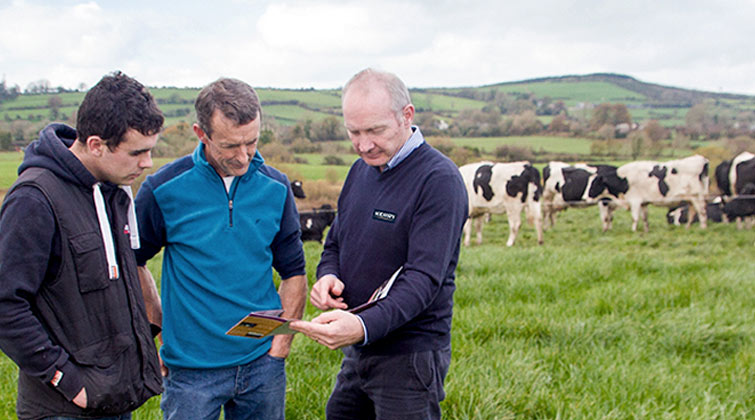By Ryan George, regional sustainability communications manager, Kerry North America
North American consumer demand for non-GMO food and beverage products is growing, yet manufacturers continue to encounter challenges in sourcing and producing market viable options, particularly within the dairy category. To meet demand, Kerry North America recently collaborated with our Irish-based Kerry Agribusiness colleagues to develop a market solution that speaks to our Irish dairy heritage and our commitment to producing quality, sustainable dairy.
Identifying a Growing Trend
Since 2010, when the Non-GMO Project’s butterfly icon first appeared on food and beverage products in North America, consumer demand has risen so that sales now exceed $25 billion annually. The trend has reached a tipping point: A recent Consumer Reports survey found that more than 70 percent of U.S. adults would rather have foods free from GMOs.
But dairy products and products made from dairy ingredients remain under-represented among Non-GMO Project Verified offerings.
“For milk and dairy ingredients to carry the butterfly logo, a cow’s diet must be Non-GMO Project Verified, and the simplest way to accomplish that is through a pasture-based or grass-fed farming system,” says Carrie Schroeder, technical business development director for Kerry North America’s dairy division. “Ireland’s rich soils and lush grasslands provide favorable conditions for its traditional, low-intensity pasture-based dairy production system. In the U.S., there’s simply not access to enough pasture for most cows to graze year-round.”
With a surge in inquiries coming into our Beloit, Wisconsin, Kerry North America headquarters, Schroeder and the rest of the dairy team sought to collaborate with the Irish-based Kerry Agribusiness, which supports our Irish milk suppliers in implementing the Sustainable Dairy Assurance Scheme. Our strong heritage in grass-based dairy production in Ireland provided the opportunity to meet the growing consumer requirement for more sustainably produced, Non-GMO Project Verified dairy in North America.
Adopting a Sustainable Solution
Geographically, Ireland is well-positioned for farming and pasture grazing, with a temperate climate and abundant rainfall. Irish farms are also traditionally small in size, with the average family farm occupying approximately 80 acres and herds typically kept to around 80 cows.
This small-scale sustainable farming model has had a positive effect on public perception. “Perhaps more than any other Irish export, North American consumers now associate Irish butter and dairy with being high-quality and great tasting,” says Schroeder.
To promote more sustainable production, in 2012 Bord Bia launched Origin Green, a national program that brings together government, the private sector and food producers to set and achieve measurable sustainability targets.
Under the Bord Bia/Origin Green Sustainable Dairy Assurance Scheme (SDAS), Irish farmers and processors can demonstrate to global customers of dairy products that milk is produced under an accredited scheme. There are 170 criteria set for farmers that ensure Irish dairy is free of antibiotics and growth hormones as well as addressing other areas of high significance regarding food safety and traceability.
SDAS is designed to track, measure, and improve on-farm practices including minimizing carbon footprint, improving soil and water quality, maintaining biodiversity and supporting animal welfare. Farms are audited every 18 months, and separate commitments are made at processor level to ensure a certified sustainable product from farm to fork.
In September 2017, Kerry became the first major milk processor in Ireland to have all 3,200 of its farms 100 percent certified under Origin Green’s SDAS.
Forging a Natural Relationship
Kerry, which started out as a dairy cooperative in 1972, has long provided high quality, grass-fed milk for its products and partners. With today’s demand for non-GMO dairy outpacing supply in the United States, our North American dairy team investigated the feasibility of bringing grass-fed dairy ingredients to the U.S. and leveraging Non-GMO Project certification.
The collaboration was a logical approach. “Because of our roots in dairy and the work we’ve done with Kerry Agribusiness to increase grass and limit supplemental feed, our Irish dairy farmers produce exactly what the Non-GMO Project expects and what North American consumers want from a pasture-based farming system,” says Schroeder.
Through the participation in Origin Green, Kerry was able to establish an evidence-based approach to supply chain sustainability, which is increasingly important as consumers demand transparency and value clean label solutions. “Because we also operate dairy processing plants in Ireland, including ones for cheese and powders, we’re able to produce various products for both retail and industrial markets, meaning we’re essentially 100 percent vertically integrated—from cow to consumer,” says Schroeder.
https://www.kerry.com/insights/kerrydigest/2018/bringing-a-non-gmo-dairy-solution-to-north-america
This article appeared in the May/June issue of The Organic & Non-GMO Report.









